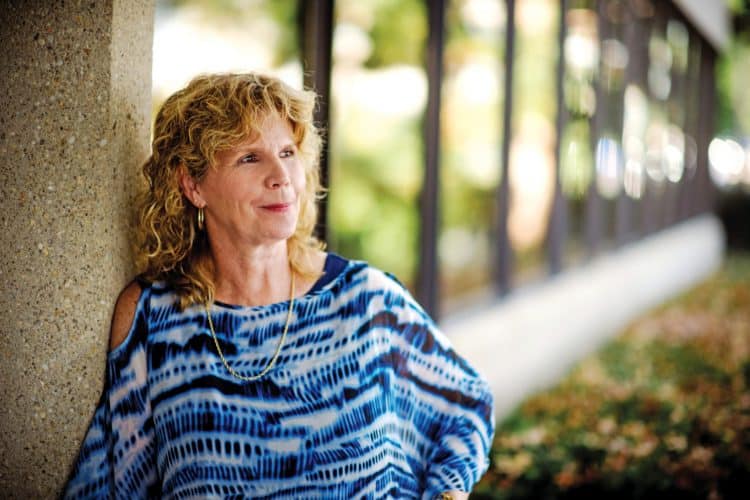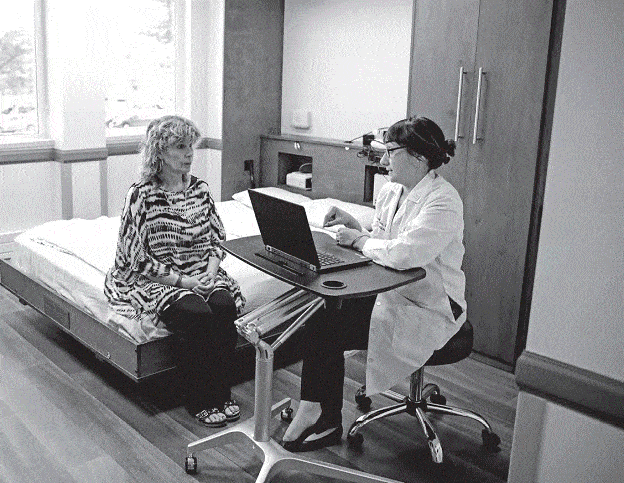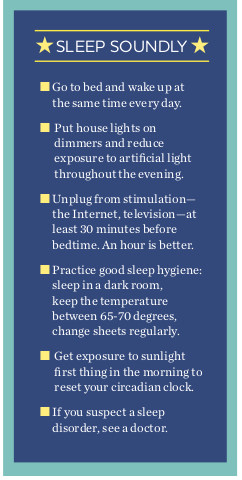IF RESTFUL SLEEP ELUDES YOU, YOU’RE NOT ALONE
STORY BY Christianna McCausland PHOTOGRAPHY BY Mary C. Gardella
November/December 2017
 Like not taking vacation, working through lunch, and being oh so busy, Americans wear their lack of sleep like a badge of honor. Fatigue is a cross to bear in the pursuit of happiness—as if exhaustion is a requirement in the fulfillment of the American dream.
Like not taking vacation, working through lunch, and being oh so busy, Americans wear their lack of sleep like a badge of honor. Fatigue is a cross to bear in the pursuit of happiness—as if exhaustion is a requirement in the fulfillment of the American dream.
More likely it will put us in the hospital.
“People forget that sleep is a basic human need and if you don’t get it there will be consequences,” says Rachel Salas, M.D., FAAN, associate professor in neurology at the Johns Hopkins Center for Sleep, located at Howard County General Hospital. Sleeping, she says, is as fundamental to our health as eating and drinking. And while the brain can’t conjure food and drink where there is none, it can force us to sleep.
“It’s called micro sleep,” Salas says, and might only last a few seconds. “But if you’re driving on the road or conducting delicate surgery,” she points out, that involuntary nap could have critical consequences.
Data collected by The Centers for Disease Control and Prevention (CDC) underscores negative impacts of lack of sleep. One-third of Americans don’t 
“Restorative and anti-inflammatory processes happen at night,” explains Dushyant Viswanathan, M.D., medical director at The Columbia Center for Integrative Medicine. In sleep, “The brain goes into housekeeping mode … metabolic bi-products are a side effect of metabolism—of living—and sleep is an important time to clean that up.”
Arianna Huffington agrees. In her book “The Sleep Revolution: Transforming Your Life, One Night at a Time,” Huffington describes collapsing in 2007 from exhaustion.
“Scientists are resoundingly confirming what our ancestors knew instinctively: that our sleep is not empty time,” Huffington states in her book. “Sleep is a time of intense neurological activity … in fact, getting the right amount of sleep enhances the quality of every minute we spend with our eyes open.”
SLEEP DISORDERS
As many as 80 million people suffer from poor sleep and 60 million of those meet the criteria for having a sleep disorder. Yet only 40 million are diagnosed. In cases like obstructive sleep apnea, where regular breathing is interrupted or obstructed, the lack of a proper diagnosis can be downright dangerous.
Symptoms of a sleep disorder can include heavy snoring, waking up gasping and excessive daytime sleepiness. Women take heed: The risk of sleep apnea goes up after menopause and women are more likely than men to suffer from sleep apnea.
“Depending on the person, you need seven to nine hours of sleep a night,” says Salas. “If you are getting adequate sleep but are still exhausted, see a doctor.”
Joanie Elder, a 56-year-old who owns a title and real estate settlement company with her husband, was one of those women who put off seeing a doctor. Not being able to sleep had dogged her throughout her life, she says. “‘I’m tired because I was up with the baby;’ ‘It’s because of menopause …’” Complaining about being tired, she says, “seemed indulgent. I only went to the doctor when I wasn’t able to function.”
In 2007 Elder developed significant insomnia; by 2010 she had to sit up or walk around the house to keep her legs from tingling and aching. By then she wasn’t sleeping at all. Her primary doctor diagnosed her with Restless Leg Syndrome (RLS), prescribed sleeping pills and referred her to a neurologist. Eventually Elder ended up in a clinical trial and met Hopkins’ Dr. Salas.
Elder ended up eliminating the sleeping pills, which didn’t work and left her “with a chemical feeling” and found a medication that helps her RLS. She has a sleep ritual that includes an evening “walking” meditation, soothing lavender oil and a hot water bottle. She does not watch television late in the evening but reads for a bit. Elder says she still has bad nights, which she embraces as part of living with RLS. But she routinely gets eight hours of sleep.
“It was like getting something back you didn’t know you’d lost,” she says of her sound sleep. “Everything—being a good wife, a good worker, a nice person—got easier.”
THE MYTH OF A MAGIC SLEEPING PILL
There are medications to treat RLS as well as a variety of treatments for sleep apnea, including continuous positive airway pressure therapy (CPAP) and dental appliances. But many sleep issues are more general, falling under the umbrella of insomnia. For that, there is no simple, singular solution.
The Center for Sleep tends to not use sleep medications, says Salas. Instead, “We’re usually taking people off them. Insomnia is so complex, there is no magic pill.”
The center employs a cognitive behavioral therapist who specializes in sleep and who helps identify such factors contributing to insomnia as anxiety or environmental issues.
Viswanathan will often have an insomniac patient go through a 24-hour test period to review cortisol levels. Elevated cortisol can be treated with melatonin, though Viswanathan notes that in the subtle science of sleep, he uses everything from essential oils to plant-based anti-inflammatories.
Gretchen Overdurff, 72, the retired CEO of a planned community who now lives in Columbia, began having sleep issues when she chose to wean herself off hormone replace therapy (HRT) she took following the start of menopause. Unlike the stress-related sleeplessness she had when working— when she couldn’t decompress to fall sleep— when she stopped the HRT she would wake at three or four in the morning unable to return to sleep.
“Working on three or four hours of sleep was hard,” she explains. “Because I’m retired I could take naps, but that made the problem worse because it disturbed my circadian rhythm.”
Overdurff knew she did not have a sleep disorder, so she sought a holistic solution with Viswanathan. Like Elder, Overdurff now has a sleep ritual. She eats dinner no later than 7 p.m., only watches light television programs and drinks little alcohol. If she’s had a stressful day she makes a cup of golden milk, a soothing drink of almond milk mixed with herbs including turmeric, nutmeg and ginger. At about 9 p.m. she does calming yoga, takes melatonin, vitamin D3 and capsules of L. Tryptophan. She sleeps in a dark room and keeps her cell phone elsewhere so tempting beeps don’t suck her into the online world.
She now sleeps 8-9 hours a night.
“Sleep impacts your performance, your health, your emotional well-being,” says Overdurff. “We as women need to under¬stand how our body works and be responsible for fostering our own well-being.”
RETURNING TO REST
For centuries, human sleep was naturally regulated by sunrise and sunset. For most of existence, the world was dark and quiet. We went to bed not really knowing (or caring) what our friends/boss/president were up to. Now we’re constantly bombarded by artificial light. We’re tempted to be online and responding at all hours, behaviors that stimulate our brains and often trigger anxiety.
We can get more and better sleep—but we have to commit to it.
Viswanathan says we need to stop thinking sleep is automatic and instead look at how we use the pre-sleep time, particularly the hours from about 9 to 11 p.m.
“Do you pass out on the sofa watching television? Are you on Facebook late into the night? Our emotional tone gets in the way of doing what needs to be done to get ourselves to that sleep state,” he explains. “We need to be kind to ourselves in that time before sleep.”
“We look at sleep as a luxury, not a human need,” adds Salas. “My message is that sleep matters and only you can prioritize it.”*





